The Life and Writings of a Latino Poet and Novelist from Nogales
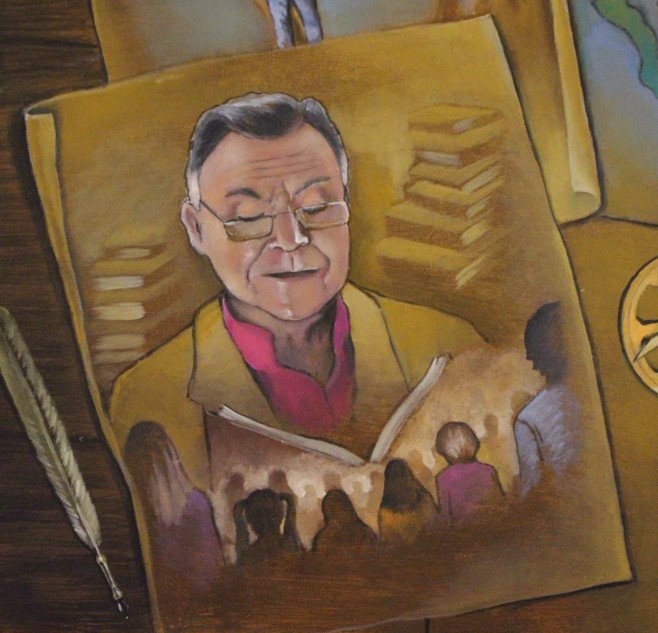
Our Hispanic Pride in Santa Cruz County
Miguel Grijalva (2024), Oil on Canvas
Hannah Fackrell, University of Arizona
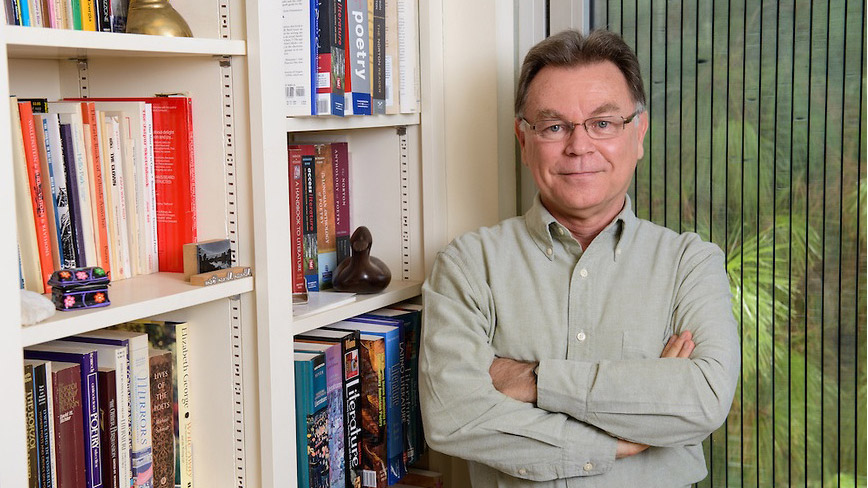
Key Concepts:
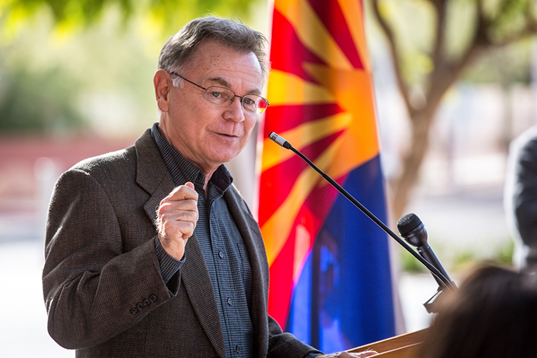
- Alberto Ríos of Nogales is Arizona’s first State Poet Laureate and has written extensively on growing up in the U.S.-Mexico border community.
- Alberto Ríos has made significant contributions to Latino literature in the United States.
- Poetry and creative writing is an important means for understanding who we are, and it is another resource to use when we study our history.
Key Terms:
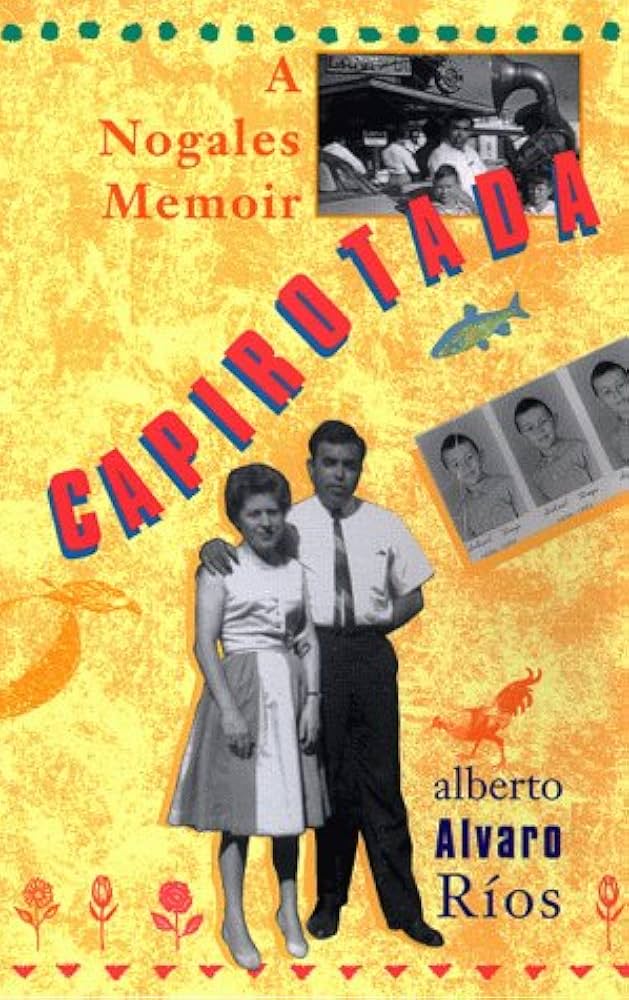
- Poet Laureate: A poet appointed to, or regarded as holding, an honorary representative position in a particular county, region or state that is typically involved in the promotion of poetry.
- Borderland: The geographical area surrounding a border which can have unique cultural, social and political characteristics due to its proximity to two different countries.
- United States-Mexico Border Region: The geographical area surrounding the United States and Mexico border, encompassing states like Arizona, New Mexico, California and Texas.
- Pimería Alta: The historic name for the region which today includes Southern Arizona and Northern Sonora.
- Heritage: Traditions, customs, and beliefs that are passed down through generations within a family, community or cultural group.
Research Article:
C2. Who is Arizona State Poet Laureate Alberto Ríos?
The Life and Writings of a Latino Poet and Novelist from Nogales
Hannah Fackrell, University of Arizona
Introduction
If you were to define the word “poetry,” what would you say? You might find the definition hard to articulate on the spot, and you are not alone. Alberto Alvaro Ríos, an accomplished poet, author, and educator, among other things, is right there with you. Alberto Ríos finds himself constantly redefining what poetry is and what it provides, feeling as though it “suffers no good definition.”[1] Alberto Ríos’ life and career have been shaped by the hands of a borderland – the space that exists in between two geographical areas. Ríos grew up in the United States-Mexico Border Region; this region spans 1,954 miles of the international boundary between Mexico and the U.S. which includes Santa Cruz County. It was through his upbringing of established boundaries, blended cultures, shared traditions, and the everyday curiosities of his childhood that pushed him to make a career out of writing. As he explains it, his Western sensibility is at the forefront of his work, defining not only who he is now, but who he has always been.[2]
Early Life & Growing Up on the Border
On September 18th, 1952, Alberto Alvaro Sr. and Agnes Ríos of Nogales welcomed their first son into the world. As both of his parents were immigrants, Alberto Ríos was exposed to multiple different cultures and languages from an early age. His father was born in Tapachula, Chiapas, Mexico. At age fourteen, his father ran away from his birthplace and aimed for the United States. Alberto Ríos’ mother, Agnes, immigrated to the United States from Warrington, Lancashire, England after meeting Alberto Alvaro Sr. during his deployment overseas; Alberto Alvaro Sr. gained his citizenship by serving in the U.S. Air Force during World War II.[3] Eye on the target, Alberto Alvaro Sr. and Agnes Ríos succeeded in making a home for themselves and their family in Nogales, Arizona.
In his coming-of-age memoir, Capirotada, Ríos intricately maps out nearly every inch of the historically known Pimería Alta region; the Pimería Alta reaches from Guaymas, Mexico on the Sea of Cortés, to Tucson, Arizona. Within the region is Ríos’ hometown. At each stop along the way, Ríos includes stories of his most defining moments. Ríos emphasizes that when you have family in one part of the region, you also have family throughout the rest of it.[4]
Throughout Ríos’ growing up, the border increasingly developed into a more physical barrier of division between Nogales, Arizona and Nogales, Mexico. However, Ríos explained that this did not serve as an interference when traveling back and forth between Mexico and the United States, and he reflected fondly on his day trips to Mexico. Whether it was for a haircut, lunch, or an adventure, there was always fun to be had and a lesson to be learned.[5] While these memories remain fond, Ríos is intentional throughout Capirotada as to not discredit the complexities of the border. He describes the relationship between the two countries and their mutual concept of what the border is versus where the border is as a “rough handshake.” [6] The relationship was blurry, similar to his relationship with holidays. In part four of Capirotada, Ríos provides personal anecdotes about the difficulties of understanding the holidays and traditions of his British mother versus those of his Mexican father. He not only had to know these holidays for what they were independently, but he also had respect for what they came to be when squished together.[7]
Academic Experience

Our Hispanic Pride in Santa Cruz County
Miguel Grijalva (2024), Oil on Canvas
Alberto Ríos completed his primary education in Santa Cruz County, attending public school. Ríos remembers moments in second grade as the origin of his curiosity for creative writing, saying what came about for him was the ability to daydream and the ability to love learning. When talking about this discovery, Ríos stated that “at that age, you cannot write a novel, really, but you can think of one.”[8] Since Ríos did not yet have anywhere to express his feelings or the means to communicate them, his imaginative efforts were put into other activities.
When Alberto Ríos reached junior high school, he began to struggle with the feeling of being disconnected from his teachers, almost as if he was abandoned by them. The initial switch from one teacher to many teachers was alarming and he felt that “even though [he] had all these teachers now, [he] didn’t get taken care of in the same way.”[9] These feelings of academic isolation pushed him towards a forbidden zone … the back of his notebook. While Ríos was supposed to be taking notes in the front of his notebook, he instead found himself doodling and writing aimlessly. At this point, Ríos understood that writing meant something to him, however he kept his rebellious scribbling in the back of his notebook as nothing more than a hobby.[10]
It was not until he pursued higher education at the University of Arizona, located in Tucson, that writing became a more permanent practice and viable career pathway. With nearly one hundred campus buildings and over 25,000 enrolled students, the University of Arizona was in a period of exponential growth and expansion during the early 1970s. It was during Alberto Ríos’ junior year that the University of Arizona first offered computers for student use.[11] The ability to view and select your course schedule on a computer unlocked a world of choices for University of Arizona students. When sorting through the endless possibilities, Ríos selected a course titled “English 9” due to its catalog marking of “No Final.”[12]

Figure 1: Alberto Ríos, in the upper left corner, and the University of Arizona Football Cheerleading Squad pose for the 1973 Desert Yearbook.[13]
It is safe to say Alberto Ríos made the correct choice in choosing English 9, as he ended up graduating from the University of Arizona with a Bachelor of Arts in Literature and Writing two years later. In 1975, Ríos earned an additional Bachelor of Arts in Psychology and following graduation, he briefly attended law school. Although his time in law school was short lived, it reminded him of his purpose and passion for writing. From that moment on, Alberto Ríos knew he was meant to be a writer and went on to earn a Master of Fine Arts in Creative Writing from the University of Arizona in 1979.[14]
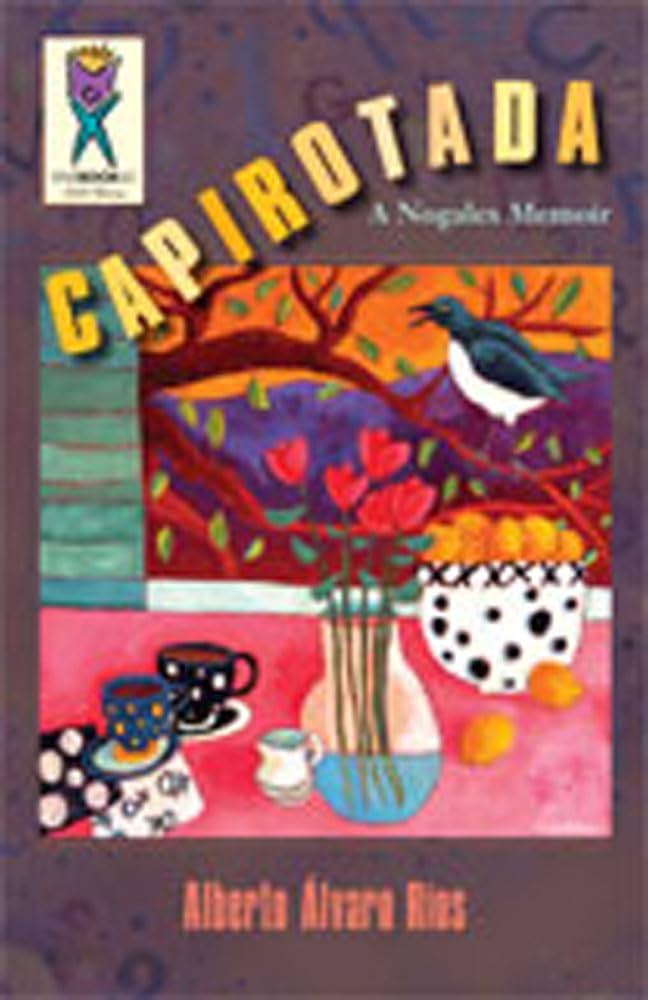
Following his academic career, Ríos began his professional career as a writer. He authored several poetry collections, including “Not Go Away is My Name” (2020) and “The Dangerous Shirt” (2009), along with short story collections like “The Curtain of Trees” (1999). One of his most notable works is Capirotada (1999) which received the Latino Literary Hall of Fame Award. Ríos spoke of the joy and satisfaction he felt after receiving his first publication, saying that “getting published meant that somebody was listening, and for a long time, that’s something that writers struggle with because you are working so hard on a voice that you forget you have to use that voice to say something.”[15]
Since 1982, Ríos has been a Professor of Letters and a Regents’ Professor of English at Arizona State University, located in Tempe. Ríos centers his teachings on literary craft, culture, and community by facilitating classroom spaces that require students to step out into the world and experience things firsthand, as poetry and literature in general is what you encounter and what you choose to make with it.[16]
Arizona State Poet Laureate:
On February 14th, 1912, Arizona officially became a U.S. state. In celebration of the state’s hundredth anniversary, state lawmakers established a position of poet laureate under Senate Bill 1348. A poet laureate is typically a government appointed position; Alberto Ríos was the first person to be inaugurated as an Arizona State Poet Laureate, in 2013.[17] When Ríos first obtained the position, its responsibilities and requirements seemed entirely undefined. When speaking to the host of PBS’s Arizona Horizon, Ted Simons, Ríos jokingly spoke of the additional workload the title would bring him, saying the position “has yet to be invented, but everybody seems to think it means more work”[18]
All in good spirit, Ríos went on to discuss the importance of his position, identifying his intention to expose the best parts of language and to break down the complexity and politicization of language across the state and nation as a whole. In his discussion of languages, specifically the language of poetry, Ríos stated, “languages are not problems, languages are solutions,” and this idea is evident through many of his works. To conclude the interview, Ríos contrasts hearing poetry from reading poetry, comparing it to a conversation. It is when the reader, or rather the listener, engages with poetic works conversationally that most impact is made.[19]
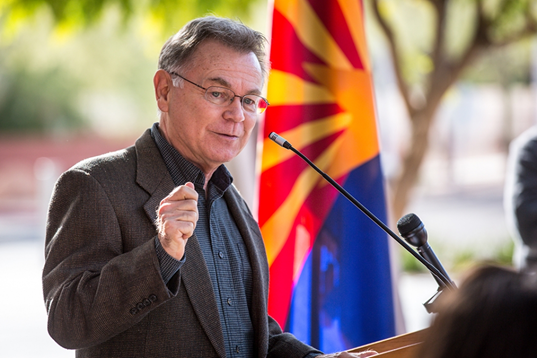
Figure 2: Arizona State Poet Laureate, Alberto Ríos, bestows the title of Phoenix, Arizona City Poet Laureate upon his colleague at Arizona State University in 2016. [20]
Conclusion:
In 2019, the Academy of American Poets sponsored the “Dear Poet” project, intending to encourage students nationwide to engage with poetry. This project included Alberto Ríos’s poem, A House Called Tomorrow. Students of all ages analyzed the poem and wrote letters to Ríos about their interactions with his work and the impact it left on them. During this project, Jackson, a high school senior and the Youth Poet Laureate of Houston and the Southwest Region, engaged in a dialogue with Alberto Ríos about the profound meaning of the poem. Through their written exchange, they explored how the poem conveys the idea that as humans, we are shaped by those who encourage us and support us daily, but also through the legacies of those who we outlive. Ríos endorsed this interpretation, emphasizing that everything around us serves as a gateway to the future. He remarked, “What’s around us is everything. What’s around us is the doorway into that house of tomorrow. We don’t live in that house alone.”[21] The people, places, and perspectives of Alberto Ríos’ life not only inform his writing, but they reappear constantly. Ríos strives “to reflect the best parts of Arizona” in his literary works by sharing what makes him proud of his home and his Hispanic heritage – the traditions, customs, and beliefs that have been passed down over the generations.[22]
“There’s a pirate’s treasure in literature, but it’s up to you to dig it up. So curiously, the maps are everywhere. Go to a library. Open a book, any book. Start plundering.”
– Alberto Alvaro Ríos, 2019 [23]
“A House Called Tomorrow,” 2018
Written by Alberto Alvaro Ríos
You are not fifteen, or twelve, or seventeen—
You are a hundred wild centuries
And fifteen, bringing with you
In every breath and in every step
Everyone who has come before you,
All the yous that you have been,
The mothers of your mother,
The fathers of your father.
If someone in your family tree was trouble,
A hundred were not:
The bad do not win—not finally,
No matter how loud they are.
We simply would not be here
If that were so.
You are made, fundamentally, from the good.
With this knowledge, you never march alone.
You are the breaking news of the century.
You are the good who has come forward
Through it all, even if so many days
Feel otherwise. But think:
When you as a child learned to speak,
It’s not that you didn’t know words—
It’s that, from the centuries, you knew so many,
And it’s hard to choose the words that will be your own.
From those centuries we human beings bring with us
The simple solutions and songs,
The river bridges and star charts and song harmonies
All in service to a simple idea:
That we can make a house called tomorrow.
What we bring, finally, into the new day, every day,
Is ourselves. And that’s all we need
To start. That’s everything we require to keep going.
Look back only for as long as you must,
Then go forward into the history you will make.
Be good, then better. Write books. Cure disease.
Make us proud. Make yourself proud.
And those who came before you? When you hear thunder,
Hear it as their applause.
Copyright © 2018 by Alberto Ríos. Used with the permission of the author.
About the Article Author:
Hannah Fackrell is currently studying History at the University of Arizona. Following graduation, Fackrell plans on becoming a high-school history teacher. She currently works as a Digital Archivist Student Assistant at the University of Arizona Special Collections Library.
Bibliography:
Academy of American Poets. “Dear Alberto Ríos 2019.” Poets.org, July 10, 2019. https://poets.org/dear-alberto-rios-2019.
“Alberto Ríos | Poetry Foundation.” Poetry Foundation, n.d. https://www.poetryfoundation.org/poets/alberto-rios.
Arizona Horizon, Season 2013, Episode 116, “Arizona Poet Laureate Alberto Ríos & AZSciTech Festival,” August 27, 2013, on PBS, https://www.pbs.org/video/arizona-horizon-arizona-poet-laureate-alberto-rios-az-scitech-festival/.
“The University of Arizona Left the Small School Class a Long Time Ago,” Arizona Daily Wildcat (Tucson, AZ), Apr. 11, 1972.
Buggle, Sadie. “ASU Professor Hopes to Be Mirror of Pride for Arizonans as Poet Laureate.” The Arizona State Press, February 14, 2023. https://www.statepress.com/article/2023/02/arizona-poet-laureate-alberto-rios-katie-hobbs-inauguration.
Greguska, Emma. “ASU Lecturer Selected as Phoenix’s Poet Laureate | ASU News,” n.d. https://news.asu.edu/20161207-arizona-impact-asu-lecturer-selected-phoenixs-poet-laureate.
Leight, Charlie. “ASU’s Alberto Ríos introduces fellow faculty.” Photograph.
Ríos, Alberto. Capirotada: a Nogales Memoir. 1st ed. Albuquerque: University of New Mexico Press, 1999.
___________ A House Called Tomorrow. Copper Canyon Press, 2018.
Primary Source Documents:
[1] Arizona Horizon, “Arizona State Poet Laureate Alberto Ríos…” 08:09.
[2] Arizona Horizon, “Arizona State Poet Laureate Alberto Ríos…” 01:54.
[3] Ríos, Capirotada, 99.
[4] Ríos, Capirotada, 2.
[5] Ríos, Capirotada, 14.
[6] Ríos, Capirotada, 12.
[7] Ríos, Capirotada, 70.
[8] Arizona Horizon, “Arizona State Poet Laureate Alberto Ríos…” 2:58.
[9] Ríos, Capirotada, 57.
[10] Arizona Horizon, “Arizona State Poet Laureate Alberto Ríos…” 4:33.
[11] Arizona Daily Wildcat, “Univ. of Arizona Left the Small School Class…” 8.
[12] Arizona Horizon, “Arizona State Poet Laureate Alberto Ríos…” 6:40.
[13] 1973 Desert Yearbook, 143.
[14] Poetry Foundation, “Alberto Ríos”
[15] Buggle, “ASU Professor Hopes to be a Mirror of Pride.”
[16] Arizona Horizon, “Arizona State Poet Laureate Alberto Ríos…” 04:52
[17] Arizona Horizon, “Arizona State Poet Laureate Alberto Ríos…” 00:40
[18] Arizona Horizon, “Arizona State Poet Laureate Alberto Ríos…” 01:14
[19] Arizona Horizon, “Arizona State Poet Laureate Alberto Ríos…” 15:36
[20] Leight, “ASU’s Alberto Ríos introduces fellow faculty.”
[21] Academy of American Poets, “Dear Alberto Ríos 2019.”
[22] Buggle, “ASU Professor Hopes to be a Mirror of Pride.”
[23] Academy of American Poets, “Dear Alberto Ríos 2019.”
